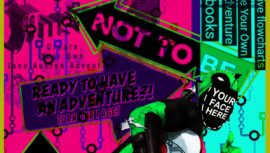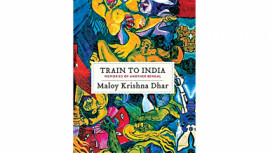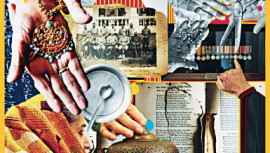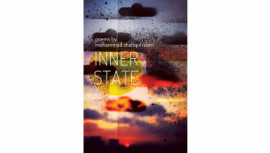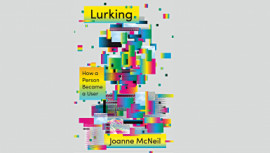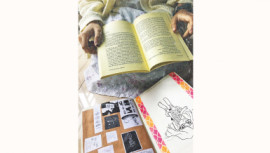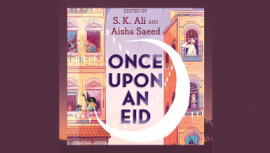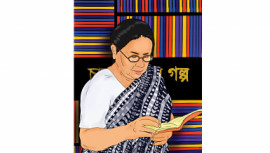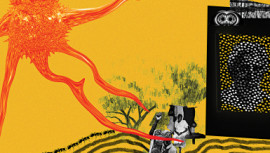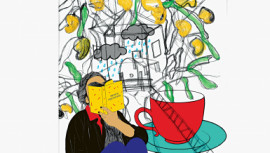-
![Revisiting forgotten babyhood days with ‘Babuibela’]()
Revisiting forgotten babyhood days with ‘Babuibela’
Every emotion associated with pregnancy and childbirth is amplified...
-
![New online journal ‘Kitchen Sink’ promises an accessible platform for poets]()
New online journal ‘Kitchen Sink’ promises an accessible platform for poets
About a month ago, a few friends sent me invites to follow the...
-
![The book that I would like to read]()
The book that I would like to read
Today I would like to talk about a book that I have been waiting to...
-
![Tahmima Anam’s ‘The Startup Wife’ arrives at Baatighar]()
Tahmima Anam’s ‘The Startup Wife’ arrives at Baatighar
Tahmima Anam’s fourth and latest novel, The Startup Wife (Penguin...
-
![Is Netflix’s ‘Ray’ worth the watch?]()
Is Netflix’s ‘Ray’ worth the watch?
Netflix’s latest anthology series, Ray, is based on four short...
-
![Who is Ayad Akhtar?]()
Who is Ayad Akhtar?
When I began reading Homeland Elegies (Little, Brown and Company,...
-
![Colm Tóibín takes Henry James for a ride]()
Colm Tóibín takes Henry James for a ride
In a detour from all the genres and topics that we review on this...
-
![Ann Patchett’s ‘The Dutch House’: On branches of memories and pain]()
Ann Patchett’s ‘The Dutch House’: On branches of memories and pain
Even though we moved out of our grandmother’s house in Dhaka more...
-
![A tribute to my father and his bookshelf]()
A tribute to my father and his bookshelf
Last week, we marked the 10th year of my father’s death, on June...
-
![Unpacking Bangladesh’s obsession with Bollywood]()
Unpacking Bangladesh’s obsession with Bollywood
Mrittika Anan Rahman (MAR): What does it say about Bollywood that...
-
![Feminism, activism, and literature: The legacy of Sufia Kamal]()
Feminism, activism, and literature: The legacy of Sufia Kamal
Sufia Kamal’s is a name revered in nearly every household in the...
-
![Sensing Bangladesh through art and poetry]()
Sensing Bangladesh through art and poetry
In their latest offering, Sensing Bangladesh – A Children’s...
-
![‘The Moment of Lift’: Melinda Gates and the developing world’s untapped female-fuel]()
‘The Moment of Lift’: Melinda Gates and the developing world’s untapped female-fuel
Female empowerment is often seen as a luxury reserved for...
-
![Books to read if you miss travelling this summer]()
Books to read if you miss travelling this summer
I know it’s hard when you want to travel, but life, owing in no...
-
![Of the peasants’ quest for a state and Bangabandhu Sheikh Mujibur Rahman]()
Of the peasants’ quest for a state and Bangabandhu Sheikh Mujibur Rahman
Afsan Chowdhury’s Sheikh Mujibur Rahman and Bangladesh: The Quest...
-
![For lovers of traveling and history]()
For lovers of traveling and history
Shamsul Alam’s From Love Lane to the World: Tales of Travel &...
-
![IFIC Kali O Kolom Young Writers Award 2020 winners announced]()
IFIC Kali O Kolom Young Writers Award 2020 winners announced
Sponsored by IFIC Bank, this year’s Kali O Kolom Torun Kabi O...
-
![Soumitra Chatterjee: The one man behind the many]()
Soumitra Chatterjee: The one man behind the many
It is impossible to ascribe any one particular character to...
-
![Forgiveness, growth, and second chances in Sarah Hogle’s ‘Twice Shy’]()
Forgiveness, growth, and second chances in Sarah Hogle’s ‘Twice Shy’
Reading Sarah Hogle’s Twice Shy (GP Putnam’s Sons, 2021) is like...
-
![My learning from Anne Frank as she turns 92]()
My learning from Anne Frank as she turns 92
Not all books fulfil the purpose of exploring metaphors or offering...
-
![Tahmima Anam launches and discusses ‘The Startup Wife’ at Hay Festival]()
Tahmima Anam launches and discusses ‘The Startup Wife’ at Hay Festival
On June 3, 2021, Bangladeshi-born British writer Tahmima Anam...
-
![A truly ‘Invincible’ comic book series]()
A truly ‘Invincible’ comic book series
While DC and Marvel, the two big dogs of the comic book industry,...
-
![Relationships lost and found in debut novel ‘Punyaha’.]()
Relationships lost and found in debut novel ‘Punyaha’.
In the middle of nowhere, among the wide expanse of paddy fields...
-
![A handbook for navigating the social media age in your profession]()
A handbook for navigating the social media age in your profession
While the world might seem like a place only made for extroverts,...
-
The road not taken, in books
One day many years ago, discovering my cousin’s tattered copy of a Give Yourself Goosebumps book completely changed my ideas about what books could be.
-
The fires of Partition in East Bengal
Three years before Maloy Krishna Dhar’s death, his memoir, Train to India: Memories of Another Bengal (Penguin India, 2009), came out. Born in a sleepy village of Kamalpur in the Bhairab-Mymensingh region next to Meghna and Brahmaputra, Dhar had an illustrious career as a teacher, journalist, intelligence officer, and writer.
-
To stitch a tapestry of trauma: Material memories of the Partition of India
A good book stays with a reader long after they’ve read the last word and placed it back on the shelf. It leaves an impression on the mind, whether because the action was exhilarating, the characters raw and real, or because reading it felt like coming back to a home you never knew you had.
-
Earth calls the soul in ‘Inner State’
“A poet’s work is to name the unnameable, to point at frauds, to take sides, start arguments, shape the world, and stop it going to sleep.”
-
A book’s plea for a better internet
“Happily, the Web is so huge that there’s no way any one company can dominate it,” wrote Tim Berners-Lee, the man who invented the World Wide Web (WWW) in 1999.
-
Conversations from the Daily Star Book Club
On the Daily Star Book Club last week, we asked members how they organise and look after their book collections at home. Here is what we learned:
-
'Once Upon An Eid': A rare glimpse into Muslim homes
Diversity can seem jaded when it is employed for the sake of appearing “woke”.
-
Rizia Rahman, an antidote to apathy
For lovers of short story collections, Rizia Rahman’s Char Doshoker Golpo (2011) can be great company on lazy afternoons. Rahman is undoubtedly among the finest writers of literature in Bangladesh, yet her craft goes unnoticed by many from the younger generations today.
-
Summers with Sarat Chandra
Before my mother bought me a copy of Sarat Shahitya Samagra (2003) one fateful summer back in high school, my exposure to Bangla literature had been limited to Feluda and whatever my textbooks offered.
-
Mangoes, lychees, and childhood memories in ‘Amar Chelebela’
For me, Amar Chelebela (1991) by Humayun Ahmed would not only be a summer read but also a comfort read, a holiday retreat, a walking tour of a Bangladesh unheard of today, and also a sneak-peak into the daily bustle of a family who redefined literature, science fiction, caricatures, humour and so much more.

























